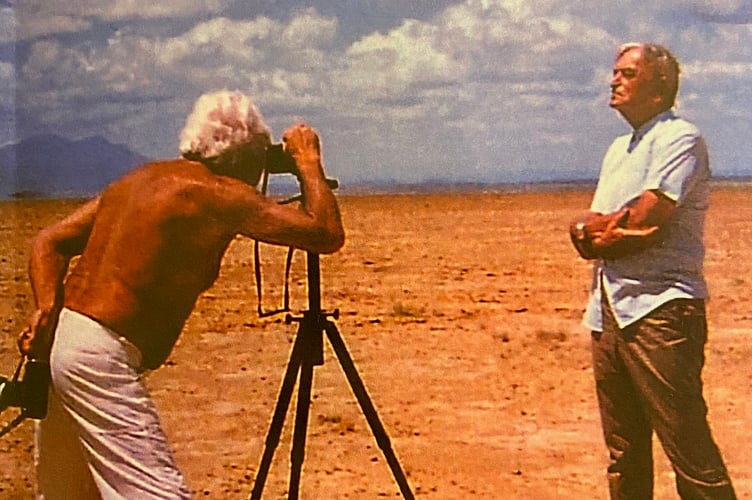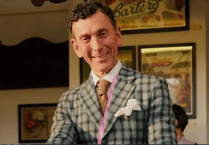Eddie Fowlie’s career in films spanned more than 50 incredible years as property master, special effects expert and all-round troubleshooter.
From modest beginnings, he burst into the movie industry during Hollywood’s Golden Era, working with some of the world’s leading film directors and biggest stars.
But it was his unique relationship with filmmaker David Lean that set him apart. Fowlie was one of a select few – a ‘dedicated maniac’ who understood the legendary director better than most. The two were a perfect foil for each other and became close friends, working on five classic epics along the way – A Bridge on the River Kwai, Lawrence of Arabia, Doctor Zhivago, Ryan’s Daughter and A Passage to India.
Among his many cinematic achievements, Fowlie helped blow up the bridge on the River Kwai, cover the Spanish countryside in fake snow in Doctor Zhivago and create the famous quicksand scene in the 1962 blockbuster, Lawrence of Arabia.
He published his memoirs, written in collaboration with South Hams journalist Richard Torné, shortly before his death in 2011.
The book has now been republished, and to coincide with its re-launch we are publishing an extract where Fowlie recounts his experiences with some of the biggest stars of the day.
“We started filming in Jordan for Lawrence of Arabia. The crew and cast began to arrive on set and I walked into the bar tent for a beer. At the far end I spotted a sort of cowboy, wearing a hat and boots and sitting with his feet slumped on the low table top, quietly watching everyone entering and leaving. This was my first glimpse of a twenty-eight-year-old, Irish-born actor from Leeds who would go on to become a star thanks to Lawrence.
David told me he had seen Peter O’Toole in a Shakespeare play and knew at once that he was ‘the one’. O’Toole was made for the role, despite being considerably taller than the real Lawrence. We got on famously, too, not least because he also liked a drink or two.
One day during a break in filming, Peter’s finely tuned nostrils alerted him to the fact that alcohol was being served by the film crew and he decided to join them. It didn’t take long for the alcohol to take effect and shortly afterwards I spotted Peter and two prop men practicing swallow dives on the sand dunes from the roof of the truck.
It was nothing out of the ordinary, though. Peter stayed up late most nights, living it up with the crew members…but he was a consummate professional. Before dawn he’d be in the make-up chair with a cold tea bag over each eye for about fifteen minutes, then make-up Chief Charlie Parker would get to work on him. Bang on cue, Peter would come on set in full costume ready to mount his camel, charge into battle, or take any orders from David. He was one of the very few actors who could pull this off. One night, he staggered back to his wooden bungalow after another typical drinking spree. Too drunk to see the door knob in the dark, he punched a hole through the door to get in and broke his hand. He didn’t seem too bothered by the incident, though, and it certainly didn’t dent his enthusiasm for drinking. During our long weekends off Peter, Omar and General Peron often went to Beirut’s famous café bars to swill Champagne by the bucket load and would invariably end up dancing on the tables with the belly dancer.

How I Won the War was a product of the late sixties. Not only was it an anti-war film but it had Beatle John Lennon in the cast - perhaps the most high-profile celebrity on the planet at the time.
Lennon’s character is killed off in a particularly gruesome way by being blown up in the sand dunes of Almeria, Spain. John was very uncomfortable with acting, despite having appeared with The Beatles in A Hard Day’s Night and Help! a few years before.
“I’m not an actor, Eddie, what do I do?” he asked nervously.
“I’ll tell you exactly what you’ve got to do, John. Just follow my instructions.”
I pointed into the distance. “See that tall tuft of grass? Just walk straight to it and ignore this thin strand of wire I’m attaching to the back of your ankle.”
As the cameras were about to roll, he grabbed his rifle and took a good long walk to the agreed point. When he got to the tuft of grass I pressed a button and my bomb blew up underneath him. But that was only the first part. I had attached the wire to an aluminium plate on his chest and stuck to that was a condom designed to burst its contents of fake blood from his belly when I triggered a tiny explosive charge. He looked shocked as he fell to the ground, but the scene wasn’t yet over. He then had to hold his guts in as the camera zoomed in on the wound and the blood pumped out from between his fingers. To this day I still can’t figure out if he did a splendid job of acting or whether he was in a genuine state of shock.
In a way I felt sorry for Lennon. He couldn’t even sit in a chair between takes without hordes of photographers, armed with lenses three-feet long, mercilessly snapping away at him. I saw him continually lying down on the ground and putting his face in the crook of his arm in a vain attempt to hide away from the paparazzi.
It wasn’t always like that, of course. Ringo Starr came out with his wife to visit him, and to while away the time I invited both of them to my house in Carboneras. John arrived in a thumping great black Rolls-Royce. In fact, everything was painted black – his favourite colour - including the tinted windows and the chrome. They were looking for thrills and the best I could offer them was to lend them my rubber boat - a Zodiac – and to let them take it out to sea. They must have had a good time because I didn’t see them again for the rest of the day. There was still no sign of them as dusk came, and I was about to call the Civil Guard when they showed up looking sheepish. God knows what they had been up to, but the dinghy was in such a bad state that it looked as though it had been rolled down a hill.
The actors playing the Musketeers in Richard Lester’s The Three Musketeers and The Four Musketeers (1973) were all hard- working types.
I had no problem with any of them except for Oliver Reed, who was a bully by nature and was always demanding and difficult to work with. Richard, with all his usual charm and diplomacy, managed to ride along with it and often turned it into an advantage, but the rest of us learnt to be careful with Ollie, more so when he was drinking (which he did for most of the time).
We found the best way of dealing with Ollie’s often loutish behaviour was to pander to him. There was no better example of this than during a sword fighting scene with Christopher Lee. Perhaps because Lee was very handy with a rapier and was showing Ollie up a bit that he turned to me in the middle of the scene, looking very flustered. “This sword’s unbalanced!” he spluttered. I took the offending rapier, gravely nodding my head and promising to “get a better one right away”.
Out of sight behind the set, I turned and hurried back again, handing him the exact, same sword. “Try this one Ollie,” I said, smiling confidently. He took it and waved it about like an Olympic fencing expert. “That’s better,” he announced and got on with the scene.”

‘David Lean’s Dedicated Maniac – memoirs of a film specialist’ by Eddie Fowlie and Richard Torné is available at Bearmanormedia.com and Amazon.com in both hardback and paperback.




Comments
This article has no comments yet. Be the first to leave a comment.